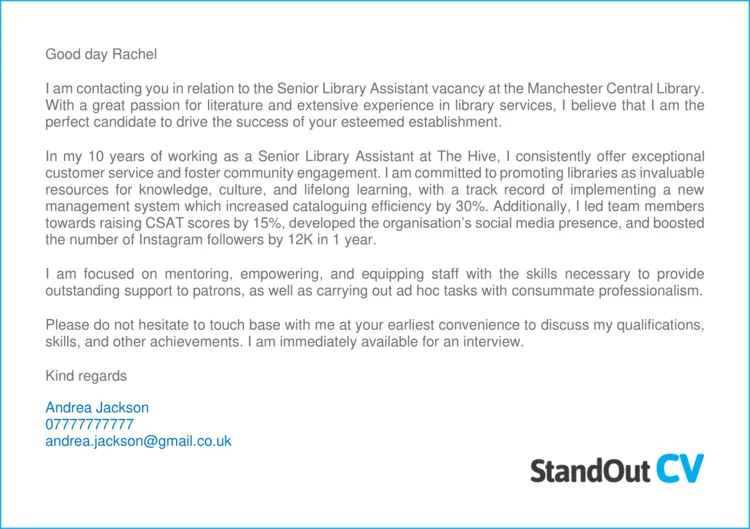Crafting a Winning Library Assistant Cover Letter
A well-crafted cover letter is your first opportunity to make a strong impression on a potential employer. For a Library Assistant position, this document serves as a critical tool to showcase not only your skills and qualifications but also your personality, enthusiasm, and understanding of the library’s mission. The cover letter should be more than just a reiteration of your resume; it should be a compelling narrative that explains why you are the ideal candidate for the job and why you are passionate about contributing to the library environment. It’s the gateway to securing an interview and potentially, the job itself. Therefore, dedicating time and effort to carefully construct a cover letter is an investment that can significantly boost your chances of success.
Researching the Library and the Role
Before you begin writing, it is crucial to do your research. Start by visiting the library’s website. Understand their mission, values, and the services they offer. Identify the specific needs of the library and the community it serves. Carefully read the job description and make note of the required skills, experience, and qualifications. This in-depth understanding is essential because it allows you to tailor your cover letter to the specific requirements of the position. This personalization demonstrates to the hiring manager that you’ve taken the time to understand their needs and are genuinely interested in the opportunity, setting you apart from generic applicants and increasing your chances of being noticed.
Highlighting Relevant Skills and Experience
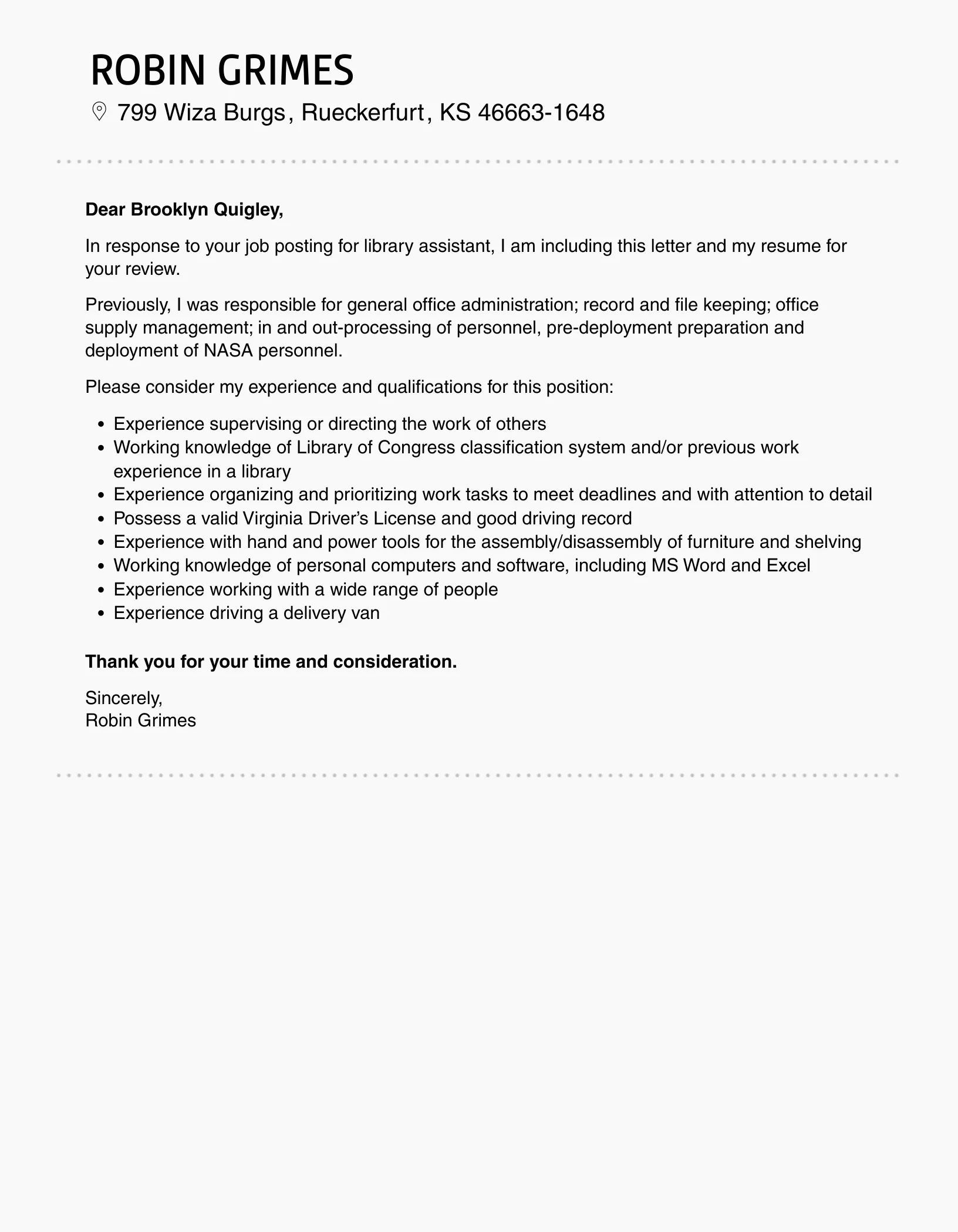
The body of your cover letter should focus on highlighting the skills and experiences most relevant to the Library Assistant role. Use concrete examples to showcase your abilities. For instance, instead of simply stating “I have excellent customer service skills,” describe a specific instance where you successfully assisted a patron, resolved a conflict, or went above and beyond to meet their needs. Quantify your accomplishments whenever possible. Instead of “Managed library resources,” state, “Managed and organized over 1,000 library items with 99% accuracy.” This approach provides tangible evidence of your skills and abilities, making your application more compelling and memorable.
Customer Service Proficiency
Customer service is at the core of a Library Assistant’s duties. Libraries serve a diverse community and require employees who are patient, empathetic, and effective communicators. Highlight any experience you have in dealing with the public, handling inquiries, resolving complaints, or providing assistance. Include examples of how you’ve adapted your communication style to suit different needs, whether that’s assisting a child with a book or helping an elderly patron with technology. Libraries often see a wide variety of patrons, including those with special needs, so any relevant experience here is beneficial. Emphasize your ability to be approachable, helpful, and maintain a positive attitude, even under pressure.
Organizational and Administrative Abilities
Library Assistants are often responsible for a range of administrative and organizational tasks. Showcase any experience you have in these areas. Mention your experience in data entry, managing files, organizing materials, or assisting with library events. If you have experience with library management software, this is a valuable asset to highlight. Illustrate your ability to manage multiple tasks, prioritize effectively, and meet deadlines. Examples of relevant experiences could include managing inventory, scheduling appointments, or assisting with budget planning. Libraries run on organization, so demonstrating your capabilities is crucial to your application. Any previous experience with this kind of work will be very beneficial.
Detail-Oriented and Accurate Work
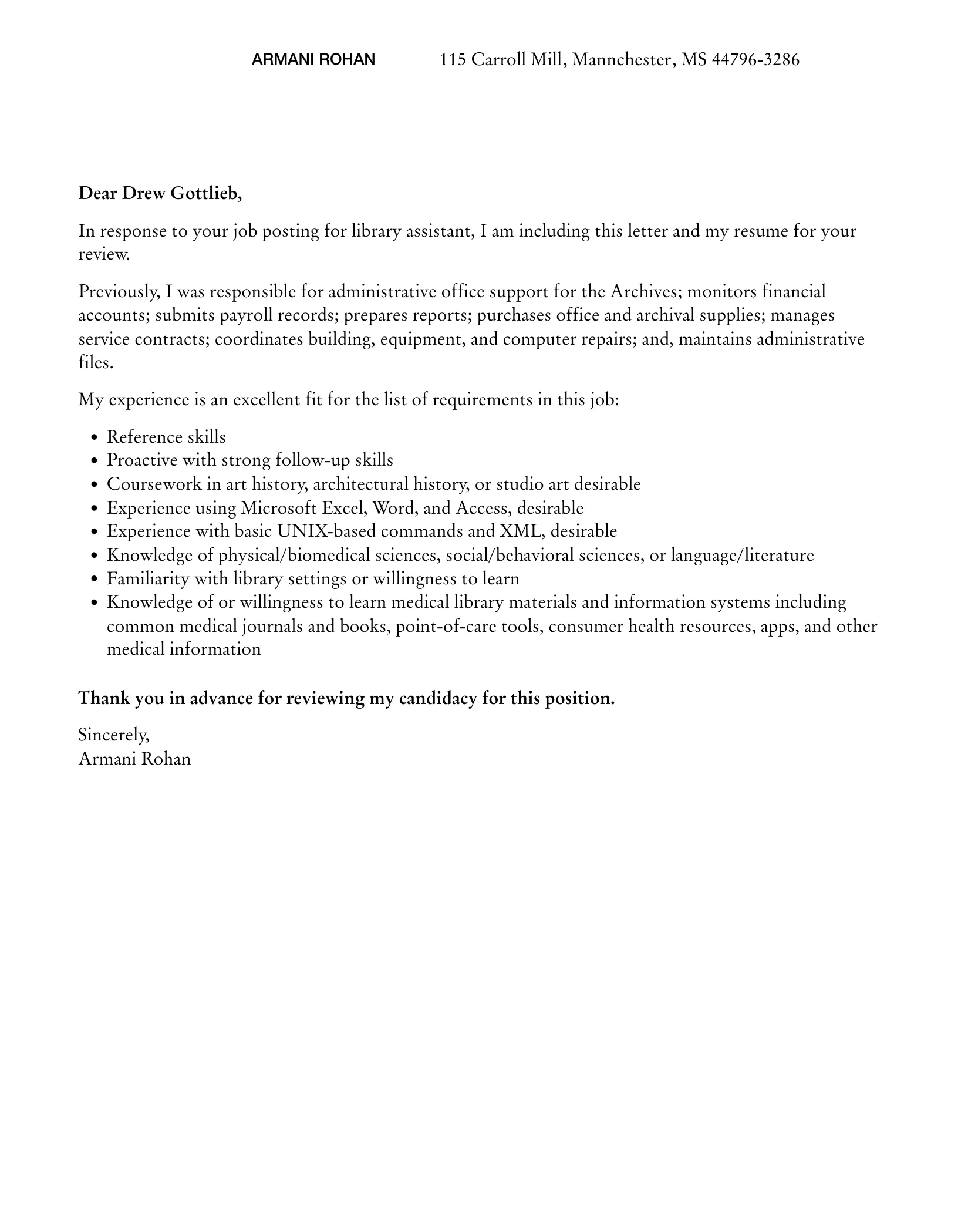
Libraries demand a high degree of accuracy and attention to detail. Mention any experience you have in proofreading, editing, or managing precise data. Describe your processes for ensuring accuracy, such as double-checking your work, using checklists, or seeking feedback. For example, you might share an experience of cataloging new books or managing a database and the steps you took to ensure accuracy. Highlighting your ability to work meticulously, and your commitment to quality, is a key indicator of your suitability for the role. Demonstrate your commitment to maintaining the integrity of library resources. Any experience managing sensitive data is a plus.
Showcasing Your Passion for Libraries
Your cover letter is an opportunity to convey your passion for libraries and their role in the community. Briefly describe why you love libraries and what you admire about the specific library you’re applying to. Mention any personal experiences that have shaped your appreciation for libraries or any ways you have used library resources. Your enthusiasm can set you apart, especially if it’s clear that you’re excited about the role and understand the value of the library as a community resource. Show that you understand that libraries are places of learning, community engagement, and access to information and that you are eager to contribute to these goals.
Tailoring Your Cover Letter
Generic cover letters are often overlooked. Tailoring your letter to each specific job application is critical. Show the hiring manager that you’ve taken the time to understand their needs and that you are genuinely interested in the opportunity. Customize your cover letter by researching the library, understanding the role, and highlighting the relevant skills and experiences that match the job description. By personalizing your cover letter, you demonstrate your genuine interest in the specific position and make a stronger case for why you are the best candidate for the role. It’s this personal touch that captures the hiring manager’s attention and indicates your dedication to the role and the institution.
Analyzing the Job Description
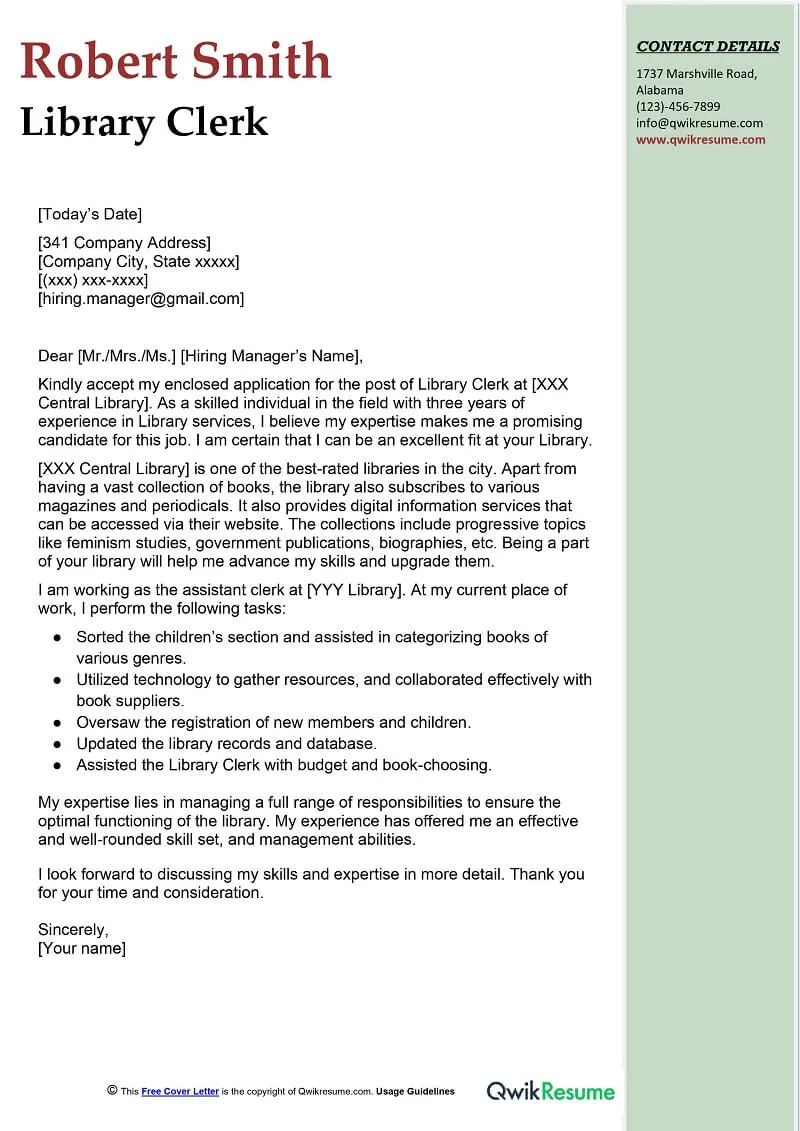
Carefully review the job description and identify the key requirements. Pay close attention to the specific skills, experience, and qualifications that the library is seeking. Make a list of these requirements and consider how your skills and experiences align with them. Use the job description as a guide to tailor your cover letter, ensuring that you highlight the most relevant information and address the specific needs of the library. Refer to the job description directly, using keywords and phrases from the original text to demonstrate your understanding and alignment with the position’s requirements.
Matching Skills with Requirements
Once you’ve analyzed the job description, match your skills and experiences to the requirements. For each key requirement, provide a specific example from your past that demonstrates your ability to meet that need. Use action verbs to describe your accomplishments and quantify your achievements whenever possible. For example, instead of saying “I assisted patrons,” say, “Assisted an average of 50 patrons per day with inquiries and provided personalized recommendations.” By directly aligning your skills with the job requirements, you show the hiring manager that you possess the qualifications needed to excel in the role. Focus on experiences that directly address the requirements set out in the job description.
Structuring Your Cover Letter
A well-structured cover letter is easy to read and conveys your message effectively. Follow a standard business letter format, including a header with your contact information, the date, and the recipient’s information. Keep your paragraphs concise and focused, and use clear, professional language. The structure should flow logically, starting with an engaging introduction, followed by body paragraphs that highlight your skills and experience, and concluding with a call to action. A clear, organized structure ensures that the hiring manager can easily understand your qualifications and appreciate your suitability for the role. Clarity and organization increase the impact of your message.
Header and Contact Information
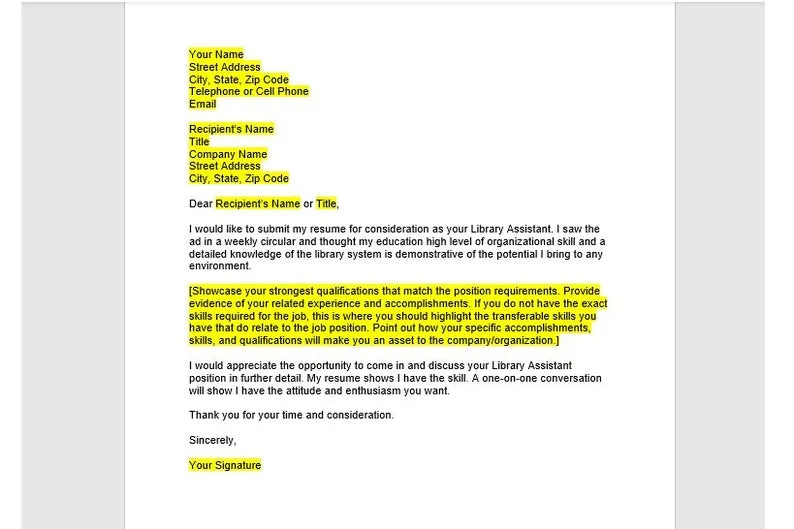
Start your cover letter with a professional header that includes your full name, address, phone number, and email address. Ensure this information is accurate and up-to-date. Below your information, include the date, followed by the name and title of the hiring manager, if known, and the library’s address. If you can’t find a specific contact person, address your letter to “Hiring Manager.” The header provides essential contact information, allowing the hiring manager to easily reach you. It also shows attention to detail and professionalism, signaling your commitment to the application process and setting the right tone for the letter.
Opening Paragraph: Capturing Attention
The opening paragraph is your opportunity to immediately capture the hiring manager’s attention. Start with a compelling statement about why you are interested in the position and the library. Mention where you found the job posting and express your enthusiasm for the role. You can also briefly mention a key skill or achievement that makes you a strong candidate. Avoid generic openings. Instead, personalize the beginning by expressing your excitement for the opportunity or referencing something specific about the library that has captured your interest. Make a memorable opening that immediately makes the reader want to continue reading.
Body Paragraphs: Skills, Experience, and Enthusiasm
The body paragraphs are where you showcase your skills and experiences. Use 2-3 paragraphs to highlight the most relevant information from your resume. Support your claims with specific examples and quantifiable achievements. Use the STAR method (Situation, Task, Action, Result) to structure your responses and provide a clear and concise description of your experience. Demonstrate your enthusiasm for the library and explain why you are a great fit for the team. Focus on demonstrating your understanding of the role’s responsibilities and your excitement to contribute to the library’s mission. This section is where you make your case for being the best candidate for the Library Assistant position.
Closing Paragraph: Call to Action
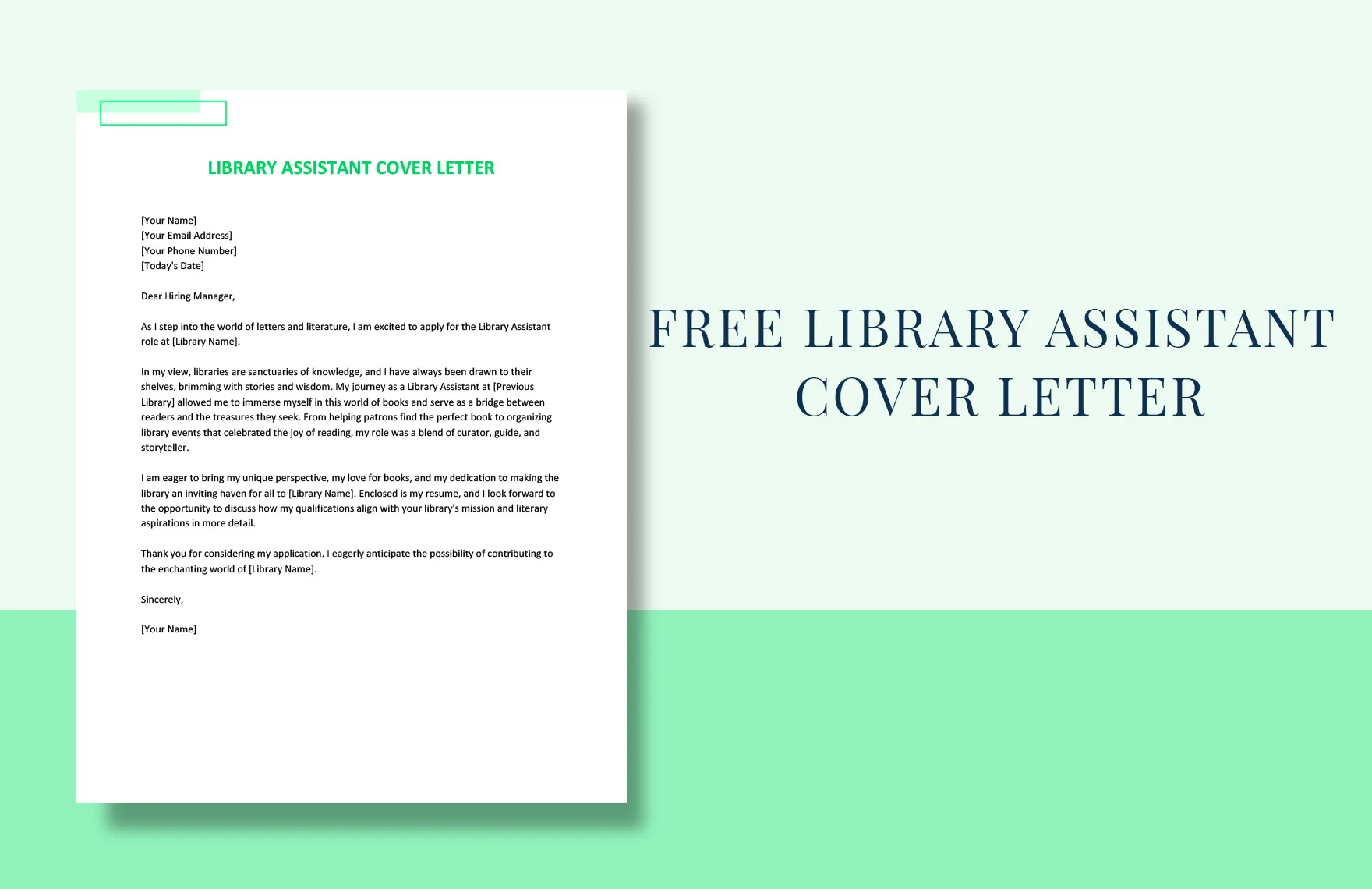
In the closing paragraph, restate your interest in the position and thank the hiring manager for their time and consideration. Include a clear call to action. State that you are eager to discuss your qualifications further and are available for an interview. Provide your contact information again, and reiterate your commitment to the role. This concluding statement should leave a positive and lasting impression, showing that you are proactive and enthusiastic. A strong close reinforces your interest and makes it easier for the hiring manager to take the next step in the hiring process.
Proofreading and Editing Your Cover Letter
Proofreading and editing your cover letter is critical to ensure it is free of errors. Errors can undermine your credibility and may lead to your application being rejected. Carefully check for typos, grammatical errors, and formatting inconsistencies. Read the cover letter aloud to identify awkward phrasing or sentences that don’t flow well. Having someone else read your letter is also highly recommended, as a fresh pair of eyes can often catch mistakes that you may have missed. A polished, error-free cover letter demonstrates your attention to detail and commitment to quality, showing you care about the application and the opportunity.
Seeking Feedback and Refinement
Seek feedback from trusted sources before submitting your cover letter. Ask friends, family members, or career advisors to review your letter and provide constructive criticism. Ask them to assess the clarity, organization, and overall impact of your cover letter. Incorporate their suggestions to refine your writing and make your cover letter even stronger. Their insights can help you refine your content and make sure you are presenting yourself in the best possible light. An objective perspective can greatly improve the effectiveness of your letter and increase your chances of getting the job.
Submitting Your Cover Letter
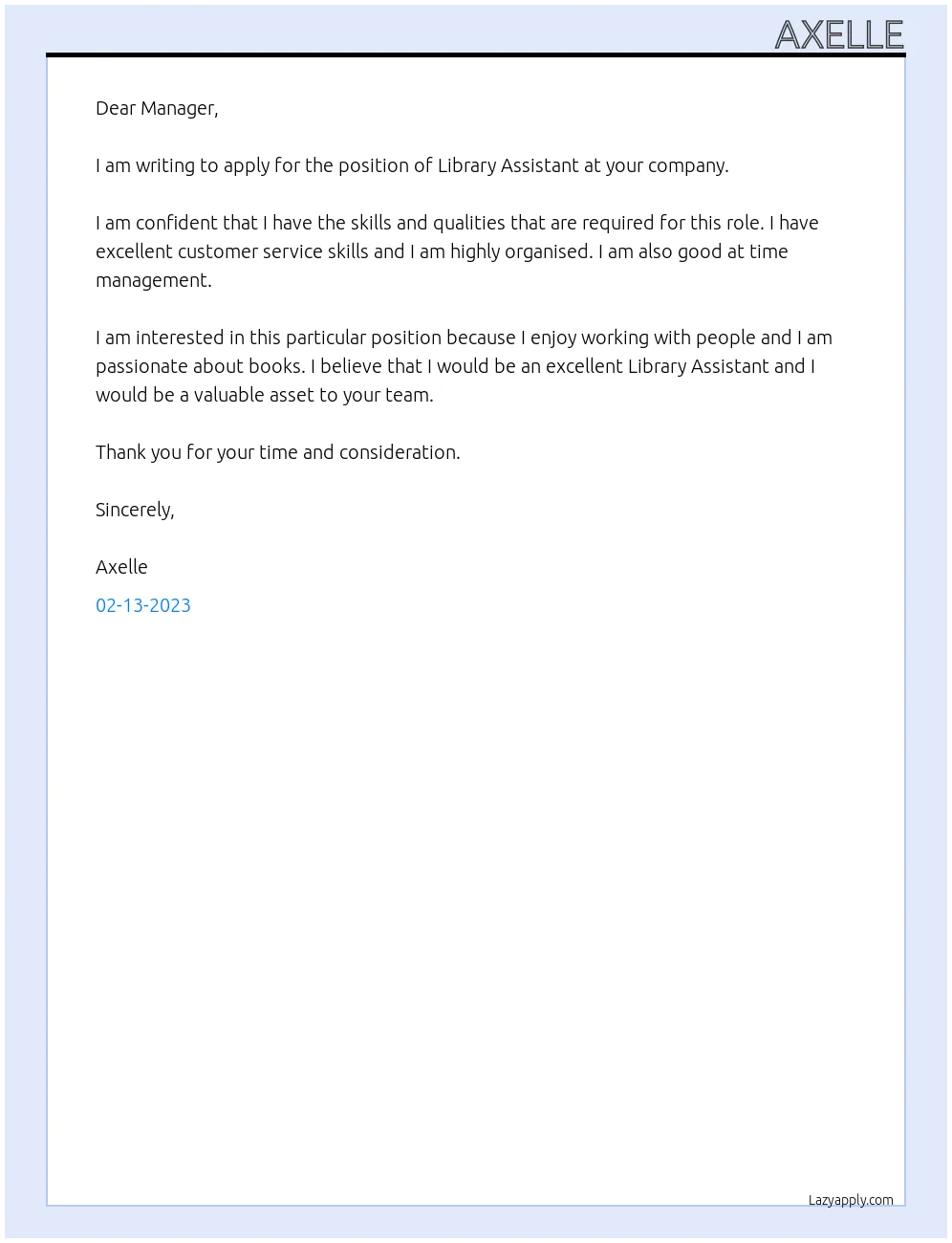
Follow the instructions provided in the job posting when submitting your cover letter. If the posting specifies a particular format or method of submission, adhere to those guidelines. Ensure that your cover letter is properly formatted and easy to read. Save your cover letter with a clear file name that includes your name and the position, such as “YourName_LibraryAssistant_CoverLetter.” Following the instructions carefully and paying attention to detail is the first step to showing you can follow directions, which is critical for any job. Make sure your cover letter looks professional and represents your application in the best possible way.
Format and Delivery
When submitting your cover letter electronically, use a professional format such as PDF. This ensures your formatting is preserved across different devices and operating systems. Make sure the font is easy to read (such as Times New Roman or Arial), with a font size of 11 or 12 points. Use clear headings and bullet points to organize your content and make it easy for the hiring manager to scan. If you’re mailing your cover letter, use high-quality paper. Your goal is to present a clean, professional document that is easy to read and conveys your qualifications clearly. Pay attention to the aesthetics of your letter; this is an important representation of your attention to detail.
Following Up
After submitting your application, it’s acceptable to follow up with the hiring manager. Send a brief email or make a phone call, usually one or two weeks after the application deadline. Express your continued interest in the position, and reiterate your qualifications. Be polite and professional, and thank the hiring manager for their time and consideration. A well-timed follow-up demonstrates your enthusiasm and initiative, which can keep you top of mind. Be respectful of the hiring manager’s time and avoid being overly persistent. A simple reminder can be an effective way to reiterate your interest in the role, but be mindful of the timing and tone of your communication.
